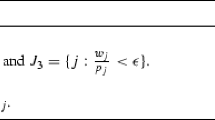Abstract
In this paper, we study a new on-line scheduling problem that each server has to process a monotonous request subsequence. The customer requests are released over-list, and the operator has to decide whether or not to accept the current request and arrange it to a server immediately. The goal of this paper is to find a strategy which accepts the maximal requests. When the number of servers k is less than that of the request types m, we give several lower bounds for this problem. Also, we present the optimal strategy for \( k=1 \) and \( k=2 \) respectively.
Access this chapter
Tax calculation will be finalised at checkout
Purchases are for personal use only
Similar content being viewed by others
References
Zervas, G., Proserpio, D., Byers, J.: The rise of the sharing economy: estimating the impact of Airbnb on the hotel industry. 18 November 2016. Boston U. School of Management Research Paper No. 2013–2016
Fredman, M.L.: On computing the length of longest increasing subsequences. Discret. Math. 11(1), 29–35 (1975)
Deorowicz, S.: An algorithm for solving the longest increasing circular subsequence problem. Inf. Process. Lett. 109(12), 630–634 (2009)
Romik, D.: The Surprising Mathematics of Longest Increasing Subsequences. Cambridge University Press, Cambridge (2014)
Albert, M.H., Golynski, A., Hamel, A.M., et al.: Longest increasing subsequences in sliding windows. Theoret. Comput. Sci. 321(2–3), 405–414 (2004)
Arlotto, A., Nguyen, V.V., Steele, J.M.: Optimal online selection of a monotone subsequence: a central limit theorem. Stochast. Process. Appl. 125(9), 3596–3622 (2014)
Nagarajan, V., Sviridenko, M.: Tight bounds for permutation flow shop scheduling. Math. Oper. Res. 34(2), 417–427 (2009)
Sitters, R.: Competitive analysis of preemptive single-machine scheduling. Oper. Res. Lett. 38(6), 585–588 (2010)
Nther, E., Maurer, O., Megow, N., et al.: A new approach to online scheduling: approximating the optimal competitive ratio. In: Twenty-Fourth ACM-SIAM Symposium on Discrete Algorithms, pp. 118–128. Society for Industrial and Applied Mathematics (2012)
Karhi, S., Shabtay, D.: On the optimality of the TLS algorithm for solving the online-list scheduling problem with two job types on a set of multipurpose machines. J. Comb. Optim. 26(1), 198–222 (2013)
Borodin, A., El-Yaniv, R.: Online Computation and Competitive Analysis. Cambridge University Press, Cambridge (1998)
Acknowledgement
This work was partially supported by the NSFC (Grant No. 71601152), and by the China Postdoctoral Science Foundation (Grant No. 2016M592811).
Author information
Authors and Affiliations
Corresponding author
Editor information
Editors and Affiliations
A Appendix
A Appendix
The analysis of ratio \( \frac{OPT(R)}{A(R)}\) in Theorem 1. Case 2.2.
As we already know, \( A(R)= 2k_{1}+2max\{k_{2},k_{3}\} +m \cdot (k- k_{1}-max\{k_{2},k_{3}\} ) \) and \( OPT(R)= k\cdot m \) for all \( m>k>2 \), where \( k_{2}+k_{3}+2k_{1}=k_{sum} \) \( (k< k_{sum}\le 2k) \). To make the ratio of \( \frac{OPT(R)}{A(R)} \) easier to solve, we analyse
We analyse the change of C with respect to \( k_{1} \), \( max\{k_{2},k_{3}\} \) and \( k_{1}+ max\{k_{2},k_{3}\} \), respectively.
Because \( k_{2}+k_{3}+2k_{1}=k_{sum} \) \( (k< k_{sum}\le 2k) \) and 5.3, we have:
and
Rights and permissions
Copyright information
© 2017 Springer International Publishing AG
About this paper
Cite this paper
Luo, K., Xu, Y., Zhang, H., Luo, W. (2017). On-line Scheduling with a Monotonous Subsequence Constraint. In: **ao, M., Rosamond, F. (eds) Frontiers in Algorithmics. FAW 2017. Lecture Notes in Computer Science(), vol 10336. Springer, Cham. https://doi.org/10.1007/978-3-319-59605-1_17
Download citation
DOI: https://doi.org/10.1007/978-3-319-59605-1_17
Published:
Publisher Name: Springer, Cham
Print ISBN: 978-3-319-59604-4
Online ISBN: 978-3-319-59605-1
eBook Packages: Computer ScienceComputer Science (R0)




